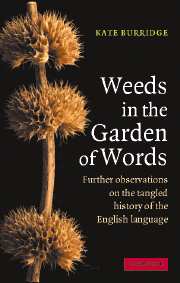Book contents
- Frontmatter
- Contents
- Acknowledgments
- Introduction to the Weedy Traits of the English Language
- Our Lexical Weeds: the World of Jargon, Slang and Euphemism
- More Lexical Weeds: Word Origins and Meaning Shifts
- Our Grammatical Weeds
- Weeds in Our Sounds and Spelling
- The Truly Nasty Weeds of the English Language?
- W(h)ither Our Weeds?
- Bibliography
- List of Interesting Words
More Lexical Weeds: Word Origins and Meaning Shifts
Published online by Cambridge University Press: 22 September 2009
- Frontmatter
- Contents
- Acknowledgments
- Introduction to the Weedy Traits of the English Language
- Our Lexical Weeds: the World of Jargon, Slang and Euphemism
- More Lexical Weeds: Word Origins and Meaning Shifts
- Our Grammatical Weeds
- Weeds in Our Sounds and Spelling
- The Truly Nasty Weeds of the English Language?
- W(h)ither Our Weeds?
- Bibliography
- List of Interesting Words
Summary
The Chickweed grows everywhere on rich cultivated land. Now we find it springing up in the garden, after a spring rain, making the beds green with its young shoots, and even in winter having the light tint of the spring leaf. In the fields it calls for the weeder's care; and under the hedge bank its white flowers bloom all the year long, save when the snows have covered every green thing. It is a very valuable plant to birds; nor is it one of the worst of those herbs which men have sometimes boiled for their food. We need hardly describe its small flower, for it may always be seen, like a little star among its leaves, when the sun is shining.
Anne Pratt The Flowering Plants, Grasses, Sedges and Ferns of Great Britain 1889Popular etymologies
Etymology is the study of the origin and history of words. It's a subject that fascinates most people – and it's often full of surprises. For example, dictionary makers and dictionary users can have quite different ideas about how a certain word or expression has come into being. Most of us have stories about the history of some word or other, and we're shocked (often irritated) when we find no mention of these in the dictionary. Lexicographers do sometimes spoil our fun with their cautious labels: ‘of uncertain origin’ or ‘etymology unknown’. But you can't blame them. Unfortunately, there's usually no evidence for these marvellous linguistic tales.
- Type
- Chapter
- Information
- Weeds in the Garden of WordsFurther Observations on the Tangled History of the English Language, pp. 49 - 83Publisher: Cambridge University PressPrint publication year: 2005



